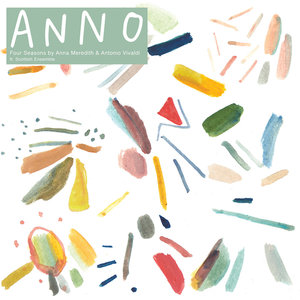Anna Meredith: Anno (Moshi Moshi)
Venerated electronic composer re-tools Vivaldi's The Four Seasons for the current age
Released Sep 2nd, 2018 via Moshi Moshi / By Max Pilley
 Anna Meredith’s debut album Varmints in 2016 was a statement. It immediately heralded a major new arrival in electronic music, so energetically did the Scottish composer’s tracks combine techno, jazz, ambient and, yes, classical. Much was made of Meredith’s classical training and her background of having been commissioned by the great and the good in the high establishment classical world at such a young age. When news of a new Meredith album arrived, it was unsurprising that it would take the form of a feature length re-working of Antonio Vivaldi’s enshrined masterpiece The Four Seasons.
Anna Meredith’s debut album Varmints in 2016 was a statement. It immediately heralded a major new arrival in electronic music, so energetically did the Scottish composer’s tracks combine techno, jazz, ambient and, yes, classical. Much was made of Meredith’s classical training and her background of having been commissioned by the great and the good in the high establishment classical world at such a young age. When news of a new Meredith album arrived, it was unsurprising that it would take the form of a feature length re-working of Antonio Vivaldi’s enshrined masterpiece The Four Seasons.It was, however, perhaps a little disappointing. In essence, she had announced a covers album. Nobody’s favourite albums are cover albums. A highfalutin’ covers album, for sure, but for Meredith taking on this challenge is the equivalent of an earnest folkie having a stab at the Woody Guthrie songbook. It’s far from an original conceit either: Max Richter is another electro-classical prodigy that took it upon himself to dig his teeth into 1725’s most famous artefact, for example.
Anno is fitfully devotional to the sacred texts: the strings and harpsichord on the most familiar strains of opening movement Spring are almost trad in their arrangement, and this continues to be true throughout the record. She uses our familiarity with the big pop moments as the foundational pillars of the piece, around which she weaves and decorates, transgresses and deviates.
One gets the impression that this is why Anno exists. Meredith appears to get a compositional thrill from daring to approach such a monument and to scuff its edges, to lop off chips and chunks of a masterpiece and glue on her own shiny new addendums. Who really knows how true the original writing is to the 1720s world that Vivaldi experienced, but one cannot ignore the sense of struggle, anxiety and conflict that the composrer lends here. It doesn’t bend to the inert Classical FM tendencies that too many ‘reworkings’ of iconic pieces do, it forcefully yanks Vivaldi into the torrid world that we attempt to live in today. Vivaldi’s sense of the passage of time comes from a pre-industrialised Europe, whereas the shadow of its decline hangs heavily on Meredith. The collision of the two visions is a history thesis waiting to happen.
As Autumn segues into Winter, Meredith’s track Chase collides into Low Light, and the changing weather is the last thing on your mind. Glitching electronics shuck and dive for supremacy, the course of another passing year seeming to cause as much pain as beauty.
The long-established flow of each ‘season’, with two quick, allegro suites sandwiching the slower, emotional core, is loosely maintained, but these allegri are comprised primarily of Meredith’s own compositions. Elements of the Vivaldi text are always the jumping off point, but she plays fast and loose with history, re-contextualising a 300-year-old document into something that breathes 21st century oxygen. She is not too reverential of the traditions to render this stuffy, but still by the very nature of the project, it does not offer her the chance to create her own history.
It is, ultimately, an academic project, a study in musical history, a set experiment, self-appointed coursework. With the modern classical scene currently enjoying its moment in the sun across Europe, this will catch many people’s attention, and may instigate many a chin-stroking observation in those niche circles. What it won’t do is satisfy the fans of Varmints who have invested in Meredith as one of the great hopes for the next generation of electronic innovation. For that we will have to wait a little longer. 7/10





 All Content RSS Feed
All Content RSS Feed
Follow Bearded on...